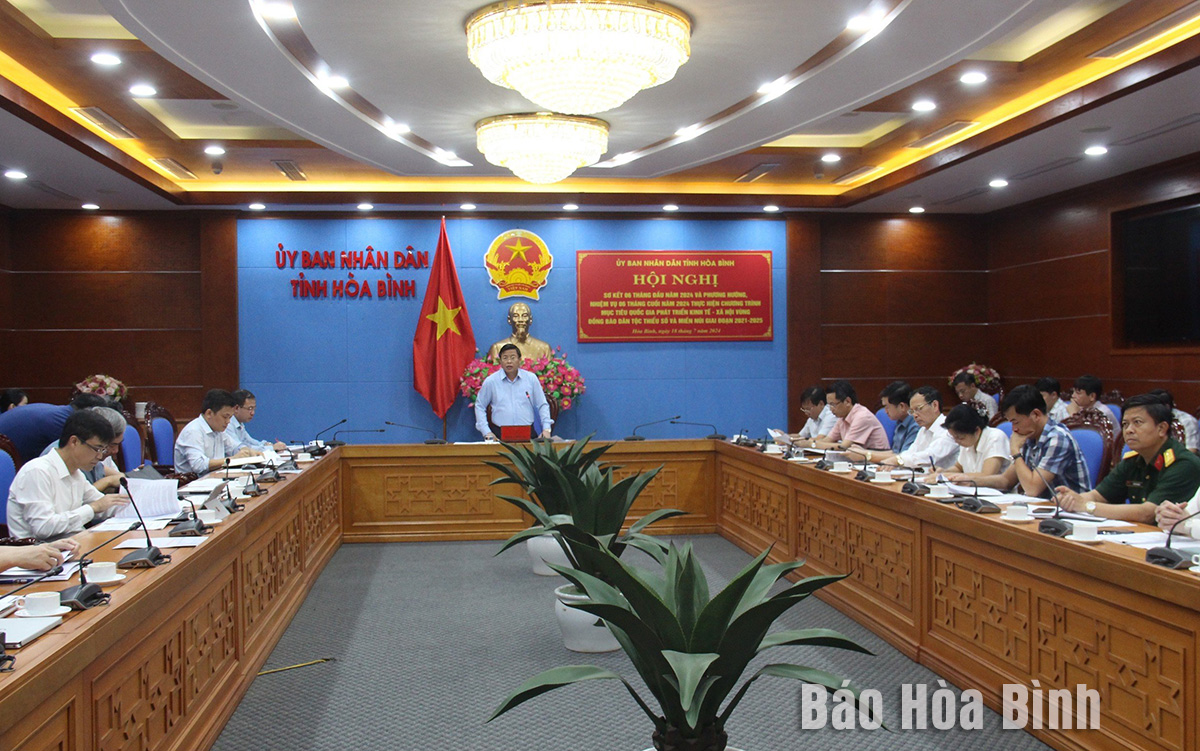
The Hoa Binh provincial People’s Committee held a meeting on July 18 to review the implementation of the national target programme on socio-economic development in ethnic minority and mountainous areas in the first half of 2024, and launch tasks and measures for H2. Vice Chairman of the provincial People’s Committee Dinh Cong Su presided over the event.
Vice Chairman of the provincial People’s Committee
Dinh Cong Su presides over the meeting.
Total funding for the programme implementation
in 2024, including the capital transferred from 2022 and 2023, stands at more
than 1.1 trillion VND (43.4 million USD). So far, over 27.6 billion VND or
8.64% of the sum transferred from 2022 and 2023, and 58.7 billion VND or 7.35%
of the capital assigned for 2024 has been disbursed.
At the meeting, officials from district-level
localities, departments, and sectors pointed out that the implementation of
some contents and the disbursement of the 2024 capital for the national target
programme are still sluggish, leading to the low disbursement rate.
They blamed the problem on the fact that the
documents guiding the programme implementation haven’t been reviewed, amended,
or supplemented in a timely manner. Preparations for the works and projects
using the state budget’s development investment capital are still made at a
snail’s pace. Some units haven’t shown reality-matching governance, policy response
remains slow, while there haven’t been breakthrough solutions.
Concluding the event, Vice Chairman Dinh Cong Su
demanded departments, sectors, and localities focus more on handling procedures
to speed up disbursement, review the works and projects lagging behind schedule
so as to build detailed disbursement plans, and specify disbursement targets to
ensure 100% of the assigned capital is allocated.
In addition, they need to enhance leaders’ sense
of responsibility towards the programme implementation; step up examination,
supervision, and assessment of the implementation of projects; and boost
monitoring to accelerate capital disbursement, he requested.
The Standing Board of the Hoa Binh provincial Party Committee has agreed in principle on a proposal by the Standing Board of the Party Committee of Hoa Binh city to gather feedback on the city’s 1:2000 zoning plan, which forms part of its broader urban development strategy.
Hoa Binh province has made notable progress in public administration reform and digital government development, with the satisfaction index among citizens and businesses reaching over 84%, according to recent government evaluations.
Thanks to great efforts by local authorities in recent times, the governance and public administration performance of Mai Chau district has been significantly improved.
In the afternoon of June 6, the Party Committee, the People's Council, the People's Committee and the Fatherland Front of Lac Son district solemnly held a meeting to celebrate the 139th anniversary of the district's founding (1886–2025) and the 79th anniversary of the establishment of the district's Party Committee (1946–2025). There was the attendance of Mr. Bui Van Thang, the Vice Chairman of the Provincial People's Council; Mr. Quach Tat Liem, the Vice Chairman of the Provincial People's Committee; Ms. Dang Bich Ngoc, the Deputy Head of the National Assembly Delegation of the province; as well as the former leaders of the province and district through various periods, who are the natives of the district.
Implementing the Politburo’s Resolution No. 57-NQ/TW on breakthroughs in science – technology, innovation, and digital transformation is a golden opportunity for the northern mountainous province of Hoa Binh to renew growth model, improve competitive edge and shorten digital gap.
Resolution 57-NQ/TW, issued by the Politburo on December 22, 2024, identifies sci-tech, innovation, and digital transformation as strategic breakthroughs to build a developed and prosperous nation. In Hoa Binh province, this spirit is not just a slogan, it’s being put into action through concrete initiatives that form a "new development triangle”: digital citizenship, digital economy, and digital administration.



